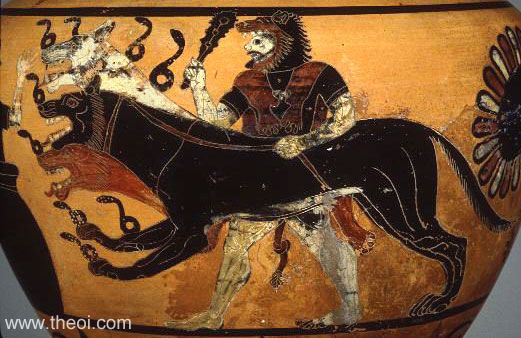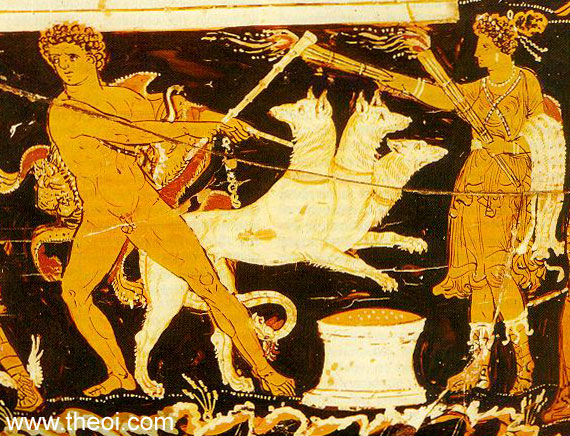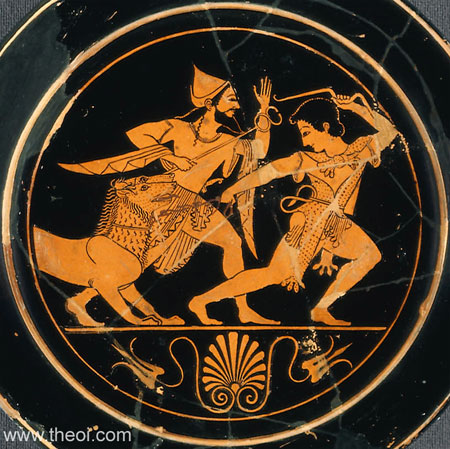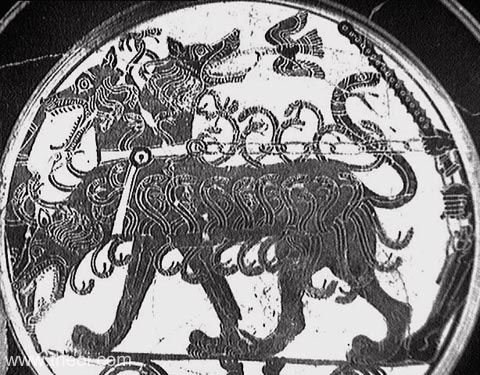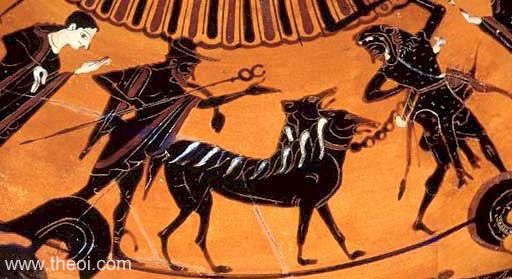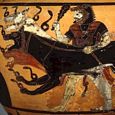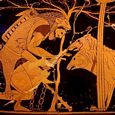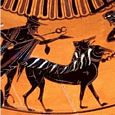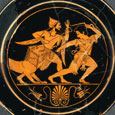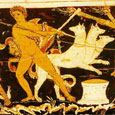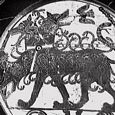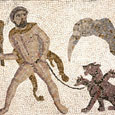CERBERUS (Kerberos) - Three-Headed Hound of Hades of Greek Mythology (original) (raw)
Greek Mythology >> Bestiary >> Cerberus (Kerberos)
Translation
Death-Darkness?
Heracles and Cerberus the hound of Hades, Caeretan black-figure hydria C6th B.C., Musée du Louvre
KERBEROS (Cerberus) was the gigantic, three-headed hound of Haides which guarded the gates of the underworld and prevented the escape of the shades of the dead.
Kerberos was depicted as a three-headed dog with a serpent's tail, mane of snakes, and a lion's claws. According to some he had fifty heads although this count may have included the serpents of his mane.
Herakles (Heracles) was sent to fetch Kerberos as one of his twelve labours, a task which he accomplished with the aid of the goddess Persephone.
Kerberos' name perhaps means "Death-Daemon of the Dark" from the ancient Greek words kêr and erebos.
FAMILY OF CERBERUS
PARENTS
[1.1] TYPHOEUS & EKHIDNA (Hesiod Theogony 310, Quintus Smyrnaeus 6.260, Hyginus Pref & Fab 30)
[1.2] EKHIDNA (Bacchylides Frag 5, Ovid Metamorphoses 7.412)
ENCYCLOPEDIA
CE′RBERUS (Kerberos), the many-headed dog that guarded the entrance of Hades, is mentioned as early as the Homeric poems, but simply as "the dog," and without the name of Cerberus. (Il. viii. 368, Od. xi. 623.) Hesiod, who is the first that gives his name and origin, calls him (Theog. 311) fifty-headed and a son of Typhaon and Echidna. Later writers describe him as a monster with only three heads, with the tail of a serpent and a mane consisting of the heads of various snakes. (Apollod. ii. 5. § 12; Eurip. Here. fur. 24, 611; Virg. Aen. vi. 417; Ov. Met. iv. 449.) Some poets again call him many-headed or hundred-headed. (Horat. Carm. ii. 13. 34; Tzetz. ad Lycoph. 678; Senec. Here. fur. 784.) The place where Cerberus kept watch was according to some at the mouth of the Acheron, and according to others at the gates of Hades, into which he admitted the shades, but never let them out again.
Source: Dictionary of Greek and Roman Biography and Mythology.
ALTERNATE NAMES
Greek Name
Κυνα του Αιδου
Transliteration
Kuna tou Aidou
Latin Spelling
Cyna Hadum
Translation
Hound of Hades
CLASSICAL LITERATURE QUOTES
Heracles, Cerberus and Hecate, Apulian red-figure volute krater C4th B.C., Staatliche Antikensammlungen
Homer, Iliad 8. 366 ff (trans. Lattimore) (Greek epic C8th B.C.) :
"If in the wiliness of my heart I [Athene] had had thoughts like his, when Herakles (Heracles) was sent down to Haides of the Gates, to hale back from Erebos (the Dark) the hound of the grisly death god (Haides Stygeros), never would he have got clear of the steep-dripping water Styx."
[N.B. In Homer the dog is just called "the hound of Haides." Hesiod is the first author to give it the name Kerberos (Cerberus).]
Homer, Odyssey 11. 623 ff (trans. Shewring) (Greek epic C8th B.C.) :
"[The ghost of Herakles addresses Odysseus in Hades :] ‘He [Eurystheus] once sent me even here [to Haides] to fetch away the hound of Haides, for he thought no task could be more fearsome for me than that. But I brought the hound out of Haides' house and up to earth, because Hermes helped me on my way, and gleaming-eyed Athene.’"
Hesiod, Theogony 310 ff (trans. Evelyn-White) (Greek epic C8th or C7th B.C.) :
"Typhaon [Typhoeus] . . . was joined in love to her [Ekhidna (Echidna)] . . . And next again she bore the unspeakable, unmanageable Kerberos (Cerberus), the savage, the bronze-barking dog of Haides, fifty-headed, and powerful, and without pity."
Hesiod, Theogony 769 ff :
"And before them [the halls of Haides and Persephone] a dreaded hound (deinos kunos) [Kerberos (Cerberus)], on watch, who has no pity, but a vile stratagem : as people go in he fawns on all, with actions of his tail and both ears, but he will not let them go back out, but lies in wait for them and eats them up, when he catches any going back through the gates."
Bacchylides, Fragment 5 (trans. Campbell, Vol. Greek Lyric IV) (Greek lyric C5th B.C.) :
"Once, they say, the gate-wrecking, unconquerable son [Herakles] of thunder-flashing Zeus went down to the house of slender-ankled Persephone to fetch up to the light from Hades the jagged-toothed dog [Kerberos (Cerberus)], son of unapproachable Ekhidna (Echidna). There he perceived the spirits of wretched mortals by the waters of Kokytos (Cocytus), like the leaves buffeted by the wind over the bright sheep-grazed headlands of Ida."
Aristophanes, Peace 315 ff (trans. O'Neill) (Greek comedy C5th to 4th B.C.) :
"[Comedy Play in which Eirene (Irene), goddess of peace, has been trapped in a deep pit :] Let us beware lest the cursed Kerberos (Cerberus) prevent us even from the nethermost hell from delivering the goddess by his furious howling, just as he did when on earth."
Aristophanes, Frogs 468 ff :
"[Comedy-Play in which Aiakos (Aeacus), the gateman of Haides, berates Herakles :] ‘O, you most shameless desperate ruffian, you O, villain, villain, arrant vilest villain! Who seized our Kerberos (Cerberus) by the throat, and fled, and ran, and rushed, and bolted, haling of the dog, my charge!’"
Pseudo-Apollodorus, Bibliotheca 2, 125 (trans. Aldrich) (Greek mythographer C2nd A.D.) :
"Herakles asked Pouton (Pluton) [Haides] for Kerberos (Cerberus), and was told to take the hound if he could overpower it without using any of the weapons he had brought with him. He found Kerberos at the gates of Akheron (Acheron), and there, pressed inside his armour and totally covered by the lion's skin, he threw his arms round its head and hung on, despite bites from the serpent-tail, until he convinced the beast with his choke-hold. Then, with it in tow, he made his ascent through Troizenos (Troezen). After showing Kerberos to Eurystheus, he took it back to Haides' realm."
Pseudo-Apollodorus, Bibliotheca 2. 122 :
"As a twelfth labour Herakles was to fetch Kerberos (Cerberus) from Haides' realm. Kerberos had three dog-heads, a serpent for a tail, and along his back the heads of all kinds of snakes."
Callimachus, Fragment 515 (trans. Trypanis) (Greek poet C3rd B.C.) :
"The foreigner [Herakles] bringing the monstrous son [Kerberos (Cerberus)] of Ekhidna (Echidna) from below."
Euphorion, Fragments (trans. Page, Vol. Select Papyri III, No. 121 (1)) (Greek epic C3rd B.C.) :
"Behind, under his [Kerberos (Cerberus)] shaggy belly cowering, the serpents that were his tail darted their tongues about his ribs. Within his eyes, a beam flashed darkly. Truly in the Forges or in Meligounis leap such sparks into the air, when iron is beaten with hammers, and the anvil roars beneath might blows,--or up inside smoke Aitna (Etna), lair of Asteropos. Still, he came alive to Tiryns out of Haides, the last of twelve labours, for the pleasure of malignant Eurystheus; and at the crossways of Mideia, rich in barley, trembling women with their children looked upon him."
Quintus Smyrnaeus, Fall of Troy 6. 260 ff (trans. Way) (Greek epic C4th A.D.) :
"[Depicted on the shield of Herakles' son Eurypylos (Eurypylus) :] And there, a dread sight even for gods to see, was Kerberos (Cerberus), whom Ekhidna (Echidna, the Loathly Worm) had borne to Typhon [Typhoeus] in a craggy cavern's gloom close on the borders of Eternal Night (Erebos), a hideous monster, warder of the Gate of Haides, home of Wailing, jailer-hound of dead folk in the shadowy Gulf of Doom. But lightly Zeus' son [Herakles] with his crashing blows tamed him, and haled him from the cataract flood of Styx, with heavy-drooping head, and dragged the Dog sore loth to the strange upper air all dauntlessly."
Plato, Republic 588c (trans. Shorey) (Greek philosopher C4th B.C.) :
"One of those natures that the ancient fables tell of, as that of the Khimaira (Chimera) or Skylla (Scylla) or Kerberos (Cerberus), and the numerous other examples that are told of many forms grown together in one."
Strabo, Geography 8. 5. 1 (trans. Jones) (Greek geographer C1st B.C. to C1st A.D.) :
"A headland that projects into the sea, Tainaron (Taenarum), with its temple of Poseidon situated in a grove; and secondly, near by, to the cavern through which, according to the myth writers, Kerberos (Cerberus) was brought up from Haides by Herakles."
Heracles, Hermes and Cerberus, Athenian red-figure kylix C6th B.C., Museum of Fine Arts Boston
Pausanias, Description of Greece 2. 35. 10 (trans. Jones) (Greek travelogue C2nd A.D.) :
"[At Hermione in Argolis] are three places which the Hermionians call that of Klymenos (Clymenus, the Famous One) [i.e. of Haides], that of Plouton (Pluton, of Wealth) [Haides], and the Lake Akherousia (Acherusia). All are surrounded by fences of stones, while in the place of Klymenos there is also a chasm in the earth. Through this according to the legend of the Hermionians, Herakles brought up the Hound of Haides [Kerberos (Cerberus)]."
Pausanias, Description of Greece 3. 25. 5 - 7 :
"On the promontory [of Tainaron (Taenarum), Lakonia] is a temple like a cave, with a statue of Poseidon in front of it. Some of the Greek poets state that Herakles brought up the Hound of Haides (Haidou kuna) [Kerberos (Cerberus)] here, though there is no road that leads underground through the cave, and it is not easy to believe that the gods possess any underground dwelling where the souls collect.
But Hekataios (Hecataeus) of Miletos gave a plausible explanation, stating that a terrible serpent lived on Tainaron, and was called the Hound of Hades, because any one bitten was bound to die of the poison at once, and it was this snake, he said, that was brought by Herakles to Eurystheus.
But Homer, who was the first to call the creature brought by Herakles the Hound of Haides, did not give it a name or describe it as of manifold form, as he did the Khimaira (Chimera). Late poets gave the name Kerberos, and though in other respects they made him resemble a dog, they say that he had three heads. Homer, however, does not imply that he was a dog, the friend of man, any more than if he called a real serpent the Hound of Hades."
Pausanias, Description of Greece 2. 31. 2 :
"[In the temple of Artemis at Troizenos (Troezen) in Argolis :] . . . are altars to the gods said to rule under the earth. It is here that they say . . . that Herakles dragged up the Hound of Haides [Kerberos (Cerberus)]."
Pausanias, Description of Greece 3. 18. 10 - 16 :
"[Illustrated on the throne of the statue of Apollon at Amyklai (Amyclae) near Sparta :] On the left stand Ekhidna (Echidna) and Typhos [Typhoeus], on the right Tritones . . . Next to these have been wrought two of the exploits of Herakles--his slaying of the Hydra, and his bringing up the Hound of Hell (kuna ton Haidou) [Kerberos (Cerberus)]."
Pausanias, Description of Greece5. 26. 7 :
"By the smaller offerings of Mikythos (Micythus) [at Olympia] . . . are some of the exploits of Herakles, including what he did to the Nemeian Lion , the Hydra, the Hound of Hell (kuna tou Haidou) [Kerberos (Cerberus)], and the boar by the river Erymanthos."
Pausanias, Description of Greece 9. 34. 5 :
"Here [on Mount Laphystios in Boiotia], say the Boiotians, Herakles ascended with the hound of Hades (kuna Haidou) [Kerberos (Cerberus)]."
Diodorus Siculus, Library of History 4. 25. 1 (trans. Oldfather) (Greek historian C1st B.C.) :
"He [Herakles] received a command from Eurystheus to bring Kerberos (Cerberus) up from Hades to the light of day. And assuming that it would be to his advantage for the accomplishment of this Labour, he went to Athens and took part in the Eleusinian Mysteries, Musaios (Musaeus), the son of Orpheus, being at that time in charge of the initiatory rites . . . Herakles then, according to the myths which have come down to us, descended into the realm of Hades, and being welcomed like a brother by Persephone brought Theseus and Peirithous back to the upper world after freeing them from their bonds. This he accomplished by the favour of Persephone, and receiving the dog Kerberos in chains he carried him away to the amazement of all and exhibited him to men."
Plutarch, Life of Nisias 1. 3 (trans. Perrin) (Greek historian C1st to C2nd A.D.) :
"The goddess Kore (Core) [Persephone] who delivered Kerberos (Cerberus) into his [Herakles'] hands."
Pseudo-Hyginus, Preface (trans. Grant) (Roman mythographer C2nd A.D.) :
"From Typhon and Echidna [was born] . . . Cerberus."
Pseudo-Hyginus, Fabulae 30 :
"He [Herakles (Heracles)] brought from the Lower World for the king to see, the dog Cerberus, offspring of Typhon." - Hyginus, Fabulae 30
Pseudo-Hyginus, Fabulae 32 :
"Hercules had been sent for the three-headed dog [Cerberus] by King Eurystheus."
Pseudo-Hyginus, Fabulae 151 :
"From Typhon the giant and Echidna were born . . . the three-headed dog Cerberus."
Pseudo-Hyginus, Fabulae 251 :
"Those who, by permission of the Parcae (Fates) [Moirai], returned from the lower world . . . Hercules, son of Jove [Zeus], to bring up the dog Cerberus."
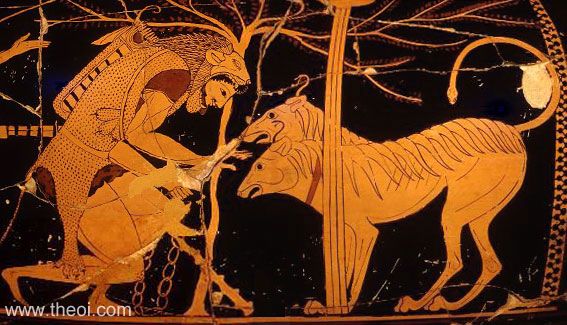
Heracles and Cerberus, Athenian red-figure amphora C6th B.C., Musée du Louvre
Ovid, Metamorphoses 4. 450 ff (trans. Melville) (Roman epic C1st B.C. to C1st A.D.) :
"The Stygian city and the cruel court of swarthy Dis [Haides] . . . she [the goddess Juno-Hera] entered and the threshold groaned under the holy tread. Immediately Cerberus sprang at her with his three heads and gave three barks together."
Ovid, Metamorphoses 4.500 ff :
"[The Erinys] Tisiphone brought with her poisons too of magic power [to cause madness] : lip-froth of Cerberus, the Echidna's venom, wild deliriums, blindnesses of the brain, and crime and tears, and maddened lust for murder; all ground up, mixed with fresh blood, boiled in a pan of bronze, and stirred with a green hemlock stick."
Ovid, Metamorphoses 7. 412 :
"For that son's [Theseus'] death Medea mixed her poisoned aconite, brought with her long ago from Scythicae's (Scythia's) shores, said to be slobbered by Echidnaea [i.e. Kerberos (Cerberus), son of Ekhidna]. There is a cavern yawning dark and deep, and there a falling track where Hero Tirynthius [Herakles of Tiryns] dragged struggling, blinking, screwing up his eyes against the sunlight and the blinding day, the hell-hound Cerberus, fast on a chain of adamant. His three throats filled the air with triple barking, barks of frenzied rage, and spattered the green meadows with white spume. This, so men think, congealed and, nourished by the rich rank soil, gained poisonous properties. And since they grow and thrive on hard bare rocks the farm folk call them ‘flintworts’--aconites. This poison Aegeus, by Medea's guile, offered to Theseus as his enemy, father to son."
Ovid, Metamorphoses 9. 184 :
"I [Herakles (Heracles) ] faced unafraid Cerberus' triple heads."
Ovid, Metamorphoses 10. 21 ff :
"[Orpheus addresses Haides, king of the underworld :] ‘I have come down not with intent to see the glooms of Tartara, nor to enchain the triple-snaked necks of Medusaeum [Kerberos (Cerberus)].’"
Ovid, Metamorphoses 10. 65 ff :
"His wits were stolen away, like him [unknown man] who saw in dread [Kerberos (Cerberus)] the three-necked hound of Hell with chains fast round his middle neck, and never lost his terror till he lost his nature too and turned to stone."
Ovid, Heroides 9. 37 ff (trans. Showerman) (Roman poetry C1st B.C. to C1st A.D.) :
"[Deianeira, wife of Herakles, laments :] ‘My lord is ever absent from me . . . ever pursuing monsters and dreadful beasts. I myself, at home and widowed, am busied with chaste prayers, in torment lest my husband fall by the savage foe; with serpents and with boars and ravening lions my imaginings are full, and with hounds three-throated [i.e. Kerberos (Cerberus)] hard upon the prey.’"
Ovid, Heroides 9. 87 ff :
"[Herakles] told of the deeds . . . Cerberus, branching from one trunk into a three-fold dog, his hair inwoven with the threatening snake."
Virgil, Aeneid 6. 417 ff (trans. Day-Lewis) (Roman epic C1st B.C.) :
"Huge Cerberus, monstrously couched in a cave confronting them, made the whole region echo with this three-throated barking. The Sibyl, seeing the snakes bristling upon his neck now, threw him for bait a cake for honey and wheat infused with sedative drugs. The creature, crazy with hunger, opened its three mouths, gobbled the bait; then its huge body relaxed and lay, sprawled out on the ground, the whole length of its cave kennel. Aeneas, passing its entrance, the watch-dog neutralize, strode rapidly from the bank of that river [Styx] of no return."
Virgil, Georgics 4. 471 ff (trans. Fairclough) (Roman bucolic C1st B.C.) :
"Stirred by his [Orpheus'] song, up from the lowest realms of Erebeus came the unsubstantial shades . . . Still more: the very house of Death and deepest abysses of Tartarus were spellbound, and the Eumenides [Erinyes] with livid snakes entwined in their hair; Cerberus stood agape and his triple jaws forgot to bark."
Propertius, Elegies 3. 5 (trans. Goold) (Roman elegy C1st B.C.) :
"Cerberus guards the cave of hell with his three throats."
Propertius, Elegies 3. 18 :
"Hither [to Haides] all shall come, hither the highest and the lowest class: evil it is, but it is a path that all must tread; all must assuage the three heads of the barking guard-dog [Kerberos (Cerberus)] and embark on the grisly greybeard's [Kharon's (Charon's)] boat that no one misses."
Propertius, Elegies 4. 5 :
"May your spirit find no peace with your ashes, but may avenging Cerberus terrify your vile bones with hungry howl."
Propertius, Elegies 4. 7 :
"Spurn not the dreams that come through the Righteous Gate [from the dead]: when righteous dreams come, they have the weight of truth. By night we [the ghosts of the dead] drift abroad, night frees imprisoned Shades, and even Cerberus casts aside his chains and strays."
Propertius, Elegies 4. 9 :
"Only to one mortal [Herakles] has the Stygian darkness become light and Cerberus has howled to find himself dragged off against the will of Dis [Haides]?"
Propertius, Elegies 4. 11 :
"Let fierce Cerberus rush at no Shades today, but let his chain hang slack from a silent bolt."
Cicero, De Natura Deorum 3. 17 (trans. Rackham) (Roman rhetorician C1st B.C.) :
"Orcus [Haides] is also a god; and the fabled streams of the lower world, Acheron, Cocytus and Pyriphlegethon, and also Charon and also Cerberus are to be deemed gods. No, you say, we must draw the line at that; well then, Orcus is not a god either."
Cerberus, Laconian black-figure kylix C6th B.C., National Archaeological Museum of Taranto
Seneca, Hercules Furens 46 ff (trans. Miller) (Roman tragedy C1st A.D.) :
"[Hera complains about Herakles :] ‘Nor is earth vast enough for him [Herakles (Heracles)]; behold, he has broken down the doors of infernal Jove [Haides], and brings back to the upper world the spoils of a conquered king [i.e. the hound Kerberos (Cerberus)]. I myself saw, yes, saw him, the shadows of nether night dispersed and Dis [Haides] overthrown, proudly displaying to his father [Zeus] a brother's spoils. Why does he not drag forth, bound and loaded down with fetters, Pluto [Haides] himself, who drew a lot equal to Jove's [Zeus']? Why does he not lord it over conquered Erebus and lay bare the Styx? It is not enough merely to return; the law of the shades has been annulled, a way back has been opened from the lowest ghosts, and the mysteries of dread Death lie bared. But he, exultant at having burst the prison of the shades, triumphs over me, and with arrogant hand leads through the cities of Greece that dusky hound. I saw the daylight shrink at sight of Cerberus, and the sun pale with fear; upon me, too, terror came, and as I gazed upon the three necks of the conquered monster I trembled at my own command.’"
Seneca, Hercules Furens 598 & 782 ff :
"[Herakles upon returning with Kerberos (Cerberus) describes his journey to the underworld :] ‘Whoever [of the gods] from on high looks down on things of earth, and would not be defiled by a strange, new sight, let him turn away his gaze, lift his eyes to heaven, and shun the portent. Let only two look on this monster [Kerberos (Cerberus)]--him who brought and her who ordered it. To appoint me penalties and tasks earth is not broad enough for Juno's [Hera's] hate. I have seen places unapproached by any, unknown to Phoebus [the sun], those gloomy spaces which the baser pole hath yielded to infernal Jove [Haides]; and if the regions of the third estate pleased me, I might have reigned. The chaos of everlasting night, and something worse than night, and the grim gods and the fates--all these I saw and, having flouted death, I have come back. What else remains? I have seen and revealed the lower world. If aught is left to do, give it to me, O Juno [Hera]; too long already dost thou let my hands lie idle. What dost thou bid me conquer?’
[Amphitryon addresses Theseus :] ‘. . . Unfold his heroic deeds in order; tell how long a way leads to the gloomy shades, and how the Tartarean dog bore his galling bonds.’
[Theseus :] ‘Next after this [the boat of Kharon (Charon)] there appears the palace of greedy Dis [Haides]. Here the savage Stygian dog [Kerberos (Cerberus)] frightens the shades; tossing back and forth his triple heads, with huge bayings he guards the realm. Around his head, foul with corruption, serpents lap, his shaggy man bristles with vipers, and in his twisted tail a long snake hisses. His rage matches his shape. Soon as he feels the stir of feet he raises his head, rough with darting snakes, and with ears erect catches at the onsped sound, wont as he is to hear even the shades. When [Herakles] the son of Jove stood closer, within his cave the dog crouches hesitant and feels a touch of fear. Then suddenly, with deep bayings, he terrifies the silent places; the snakes hiss threateningly along all his shoulders. The clamour of his dreadful voice, issuing from triple throats, fills even the blessed shades with dread. Then from his left arm the hero looses the fierce-grinning jaws, thrusts out before him the Cleonaean head and, beneath that huge shield crouching, plies his mighty club with victorious right hand. Now here, now there, with unremitting blows he whirls it, redoubling the strokes. At last the dog, vanquished ceases his threatenings and, spent with struggle, lowers all his heads and yields all wardship of his cavern. Both rulers [Haides and Persephone] shiver on their throne, and bid lead the dog away. Me also [Theseus trapped in Haides] they give as boon to Alcides' prayer.
‘Then, stroking the monster's sullen necks, he binds him with chains of adamant. Forgetful of himself, the watchful guardian of the dusky realm droops his ears, trembling and willing to be led, owns his master, and with muzzle lowered follows after, beating both his sides with snaky tail. But when he came to the Taenarian borders, and the strange gleam of unknown light smote on his eyes, though conquered he regained his courage and in frenzy shook his ponderous chains. Almost he bore his conqueror away, back dragging him, forward bent, and forced him to give ground. Then even to my aid Alcides [Herakles] looked, and with our twofold strength we drew the dog along, mad with rage and attempting fruitless war, and brought him out to earth. But when he saw the bright light of day and viewed the clear spaces of the shining sky, black night rose over him and he turned his gaze to ground, closed tight his eyes and shut out the hated light; backward he turned his face and with all his necks sought the earth; then in the shadow of Hercules he hid his head.’"
Seneca, Hercules Furens 984 ff :
"Cruel Tisiphone [one of the Erinyes (Furies)] . . . since the dog [Kerberos (Cerberus)] was stolen away [by Herakles] has blocked the empty gate [of Haides] with her outstretched torch."
Seneca, Hercules Furens 1107 ff :
"Fierce Cerberus, crouching in his lowest cave, his necks still bound with chains."
Seneca, Oedipus 160 ff :
"[Drought and pestilence ravage the city of Thebes :] They have burst the bars of abysmal Erebus, the throng of sisters with Tartarean torch [i.e. the Erinyes, (Furies)] . . . Dark Mors (Death) [Thanatos], death opens wide his greedy, gaping jaws and unfolds all his wings . . . Nay more, they say that the dog [Kerberos (Cerberus)] has burst his chains of Taenarian iron, and is wandering through our fields; that the earth has rumbled; that ghosts go stealing through the groves, larger than mortal forms."
Seneca, Oedipus 559 ff :
"[The Theban seer Teiresias (Tiresias) performs the rites of necromancy :] Then he summons the spirits of the dead, and thee who rulest the spirits [Haides], and him [Kerberos (Cerberus)] who blocks the entrance to the Lethaean stream; o'er and o'er and o'er he repeats a magic rune, and fiercely, with frenzied lips, he chants a charm which either appeases or compels the flitting ghosts . . . the whole place was shaken and the ground was stricken from below . . . blind Chaos is burst open, and for the tribes of Dis [Haides] a way is given to the upper world . . . in mad rage three-headed Cerberus shook his heavy chains."
Seneca, Phaedra 222 ff :
"Trust not in Dis [Haides]. Though he bar his realm, and though the Stygian dog [Kerberos (Cerberus)] keep guard o'er the grim doors, Theseus alone finds out forbidden ways."
Seneca, Phaedra 843 ff :
"Alcides [Herakles] . . . when he dragged the dog [Kerberos (Cerberus)] by violence out of Tartarus, brought me [Theseus], too, along with him to the upper world."
Seneca, Troades 402 ff :
"Taenarus and the cruel tyrant's [Haides] kingdom and Cerberus, guarding the portal of no easy passage."
Hermes, Cerberus and Heracles, Athenian black-figure hydria C6th B.C., Toledo Museum of Art
Valerius Flaccus, Argonautica 3. 224 (trans. Mozley) (Roman epic C1st A.D.) :
"[The Titan] Coeus in the lowest pit [of Tartaros] burst the adamantine bonds and trailing Jove's [Zeus'] fettering chains . . . conceives a hope of scaling heaven, yet though he repass the rivers and the gloom [Kerberos (Cerberus)] the hound of the Furiai (Furies) [Erinyes] and the sprawling Hydra's crest [the two guardians of Haides] repel him."
Valerius Flaccus, Argonautica 6. 110 ff :
"Baying [of Hounds] loud as that which rings at the grim gate of Dis [Haides] [i.e. the bark of Kerberos, Cerberus] or from Hecate's escort to the world above."
Statius, Thebaid 2. 27 (trans. Mozley) (Roman epic C1st A.D.) :
"Cerberus lying on the murky threshold perceived them, and reared up with all his mouths wide agape, fierce even to entering folk; but now his black neck swelled up all threatening, now had he torn and scattered their bones upon the ground, had not the god [Hermes] with branch Lethaean soothed his bristling frame and quelled with threefold slumber the steely glare."
Statius, Thebaid 2. 52 ff :
"The baying of death's tri-formed warder [Kerberos (Cerberus)] has scared the rustics from the fields [around the entrance to Haides at Tainaron]."
Statius, Thebaid 4. 410 ff :
"[Teiresias (Tiresias) performs the rites of nekromankia summoning ghosts from the underworld :] ‘Nor let Cerberus interpose his heads, and turn aside the ghosts that lack the light.’"
Statius, Thebaid 8. 53 ff :
"Fierce Alcides [Herakles] [provoked Haides], when the iron threshold of Cerberus' gate fell silent, its guardian removed."
Statius, Silvae 2. 1. 183 ff (trans. Mozley) (Roman poetry C1st A.D.) :
"Lay aside thy fears [for the beloved dead], and be no more in dread of threatening Letus (Death) [Thanatos]: Cerberus with triple jaws will not bark at him."
Statius, Silvae 2. 1. 228 ff :
"Neither the ferryman [Kharon (Charon)] nor the comrade [the Hydra] of the cruel beast [Kerberos (Cerberus)] bars the way [to the Underworld] to innocent souls."
Statius, Silvae 3. 3. 21 ff :
"Tis a happy shade that is coming, ay, too happy, for his son laments him. Avaunt, ye hissing Furiae (Furies) [Erinyes], avaunt the threefold guardian [Kerberos (Cerberus)]! Let the long road lie clear for the peerless spirits."
Statius, Silvae 5. 3. 260 ff :
"But do ye, O monarchs of the dead and thou, Ennean Juno [Persephone], if ye approve my prayer [provide a peaceful journey for the soul of my dead father] . . . let the warder of the gate [Kerberos (Cerberus)] make no fierce barking."
Apuleius, The Golden Ass 1. 15 ff (trans. Walsh) (Roman novel C2nd A.D.) :
"At that moment, as I recall, the earth yawned open [by the power of witches]. I caught a glimpse of Tartarus deep below, and of Cerberus waiting to make a meal of me to relive his hunger."
Apuleius, The Golden Ass 6. 19 ff :
"[Psykhe (Psyche) is given instructions for her journey down into the underworld :] When you have crossed the river [Akheron (Acheron)] and have advanced a little further, some aged women weaving at the loom will beg you to lend a hand for a short time. But you are not permitted to touch that either, for all these and many other distractions are part of the ambush which Venus [Aphrodite] will set to induce you to release one of the cakes from your hands. Do not imaging that the loss of a mere barley cake is a trivial matter, for if you relinquish either of them, the daylight of this world above will be totally denied you. Posted there is [Kerberos (Cerberus)] a massive hound with a huge, triple-formed head. This monstrous, fearsome brute confronts the dead with thunderous barking, though his menaces are futile since he can do them no harm. He keeps constant guard before the very threshold and the dark hall of Proserpina [Persephone], protecting that deserted abode of Dis [Haides]. You must disarm him by offering him a cake as his spoils. Then you can easily pass him, and gain immediate access to Proserpina herself . . . When you have obtained what she gives you, you must make your way back, using the remaining cake to neutralize the dog's savagery."
ANCIENT GREEK ART
M12.1 Heracles & Cerberus
Caeretan Black Figure Vase Painting C6th B.C.
M12.2 Heracles & Cerberus
Athenian Bilingual Vase Painting C6th B.C.
M12.3 Heracles, Cerberus, Hermes
Athenian Black Figure Vase Painting C6th B.C.
M12.5 Heracles, Cerberus, Hermes
Athenian Red Figure Vase Painting C6th B.C.
T16.2 Heracles, Cerberus, Hecate
Apulian Red Figure Vase Painting C4th B.C.
M12.4 Heracles & Cerberus
Laconian Black Figure Vase Painting C6th B.C.
Z26.1F Heracles & Cerberus
Greco-Roman Llíria Floor Mosaic C3rd A.D.
SOURCES
GREEK
- Homer, The Iliad - Greek Epic C8th B.C.
- Homer, The Odyssey - Greek Epic C8th B.C.
- Hesiod, Theogony - Greek Epic C8th - 7th B.C.
- Greek Lyric IV Bacchylides, Fragments - Greek Lyric C5th B.C.
- Aristophanes, Frogs - Greek Comedy C5th - 4th B.C.
- Aristophanes, Peace - Greek Comedy C5th - 4th B.C.
- Plato, Republic - Greek Philosophy C4th B.C.
- Apollodorus, The Library - Greek Mythography C2nd A.D.
- Callimachus, Fragments - Greek Poetry C3rd B.C.
- Greek Papyri III Euphorion, Fragments - Greek Epic C3rd B.C.
- Diodorus Siculus, The Library of History - Greek History C1st B.C.
- Strabo, Geography - Greek Geography C1st B.C. - C1st A.D.
- Pausanias, Description of Greece - Greek Travelogue C2nd A.D.
- Plutarch, Lives - Greek Historian C1st - 2nd A.D.
- Quintus Smyrnaeus, Fall of Troy - Greek Epic C4th A.D.
ROMAN
- Hyginus, Fabulae - Latin Mythography C2nd A.D.
- Ovid, Metamorphoses - Latin Epic C1st B.C. - C1st A.D.
- Ovid, Heroides - Latin Poetry C1st B.C. - C1st A.D.
- Virgil, Aeneid - Latin Epic C1st B.C.
- Virgil, Georgics - Latin Bucolic C1st B.C.
- Propertius, Elegies - Latin Elegy C1st B.C.
- Cicero, De Natura Deorum - Latin Rhetoric C1st B.C.
- Seneca, Hercules Furens - Latin Tragedy C1st A.D.
- Seneca, Oedipus - Latin Tragedy C1st A.D.
- Seneca, Phaedra - Latin Tragedy C1st A.D.
- Seneca, Troades - Latin Tragedy C1st A.D.
- Valerius Flaccus, The Argonautica - Latin Epic C1st A.D.
- Statius, Thebaid - Latin Epic C1st A.D.
- Statius, Silvae - Latin Poetry C1st A.D.
- Apuleius, The Golden Ass - Latin Novel C2nd A.D.
OTHER SOURCES
Other references not currently quoted here: Euripides Heracles 25 & 611.
BIBLIOGRAPHY
A complete bibliography of the translations quoted on this page.
